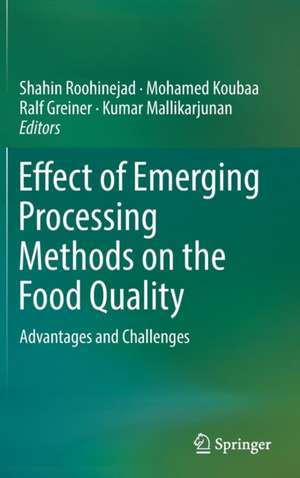Effect of Emerging Processing Methods on the Food Quality: Advantages and Challenges
Editat de Shahin Roohinejad, Mohamed Koubaa, Ralf Greiner, Kumar Mallikarjunanen Limba Engleză Hardback – 14 aug 2019
Effect of Emerging Processing Methods on the Food Quality: Advantages and Challenges not only covers the advantagesof using innovative processing methods, but also the disadvantages and challenges of using these techniques on food quality. Each chapter focuses on a different emerging processing technique, breaking down the sensory, textural and nutritional aspects for different food products in addition to the advantages and challenges for each method. New technologies and advanced theories are a major focus, pointing to innovative new paths for the quality and safety assurance in food products. From pulsed electric fields to ultrasounds, this work covers all aspects of emerging processing techniques for fruits and vegetables, foods and dairy products.
| Toate formatele și edițiile | Preț | Express |
|---|---|---|
| Paperback (1) | 940.72 lei 6-8 săpt. | |
| Springer International Publishing – 15 aug 2020 | 940.72 lei 6-8 săpt. | |
| Hardback (1) | 946.72 lei 6-8 săpt. | |
| Springer International Publishing – 14 aug 2019 | 946.72 lei 6-8 săpt. |
Preț: 946.72 lei
Preț vechi: 1154.54 lei
-18% Nou
Puncte Express: 1420
Preț estimativ în valută:
181.17€ • 188.08$ • 151.07£
181.17€ • 188.08$ • 151.07£
Carte tipărită la comandă
Livrare economică 22 martie-05 aprilie
Preluare comenzi: 021 569.72.76
Specificații
ISBN-13: 9783030181901
ISBN-10: 3030181901
Pagini: 440
Ilustrații: XIII, 200 p. 9 illus., 7 illus. in color.
Dimensiuni: 155 x 235 mm
Greutate: 0.48 kg
Ediția:1st ed. 2019
Editura: Springer International Publishing
Colecția Springer
Locul publicării:Cham, Switzerland
ISBN-10: 3030181901
Pagini: 440
Ilustrații: XIII, 200 p. 9 illus., 7 illus. in color.
Dimensiuni: 155 x 235 mm
Greutate: 0.48 kg
Ediția:1st ed. 2019
Editura: Springer International Publishing
Colecția Springer
Locul publicării:Cham, Switzerland
Cuprins
Assessment of food quality using profiling techniques: Pros and cons aspects.- Handling the data generated by profiling techniques for evaluation the food quality.- High pressure processing.- Pulsed electric fields.- Ultraviolet.- Pulsed light.- Irradiation.- Ultrasounds
Notă biografică
Shahin Roohinejad is a Research Scientist at Tillamook County Creamery Association, Oregon, USA. Previously, he was a Postdoctoral Research Associate at the Department of Food Science and Nutrition, University of Minnesota, St. Paul, USA.
Mohamed Koubaa is an Assistant Professor in the process and chemical engineering at the Graduate School of Organic and Mineral Chemistry (Ecole Supérieure de Chimie Organique et Minérale) in Compiègne (France).
Ralf Greiner is a Professor in the Department of Food Technology and Bioprocess Engineering at the Max Rubner-Institut, Federal Research Institute of Nutrition and Food in Karlsruhe, Germany.
Kumar Mallikarjunan is a Professor in the Department of Food Science and Nutrition, University of Minnesota, St. Paul, USA.
Mohamed Koubaa is an Assistant Professor in the process and chemical engineering at the Graduate School of Organic and Mineral Chemistry (Ecole Supérieure de Chimie Organique et Minérale) in Compiègne (France).
Ralf Greiner is a Professor in the Department of Food Technology and Bioprocess Engineering at the Max Rubner-Institut, Federal Research Institute of Nutrition and Food in Karlsruhe, Germany.
Kumar Mallikarjunan is a Professor in the Department of Food Science and Nutrition, University of Minnesota, St. Paul, USA.
Textul de pe ultima copertă
This text comprehensively covers novel, innovative technologies used in the food and beverage industries in order to provide safe and healthy foods for consumers. The research provided in these chapters aims to show that the traditional pasteurization and commercial sterilization of foods result in unacceptable quality and nutrient retention, creating an important need for alternative methods used to minimize undesirable reactions such as thermal decomposition or degradation. Emerging processing methods to minimize heat induced alterations in foods and their applications are covered in-depth, demonstrating that these methods are useful not only for the inactivation of microorganisms and enzymes but also for improving the yield and development of ingredients and marketable foods with higher quality and better nutritional characteristics.
Effect of Emerging Processing Methods on the Food Quality: Advantages and Challenges not only covers the advantages of usinginnovative processing methods, but also the disadvantages and challenges of using these techniques on food quality. Each chapter focuses on a different emerging processing technique, breaking down the sensory, textural and nutritional aspects for different food products in addition to the advantages and challenges for each method. New technologies and advanced theories are a major focus, pointing to innovative new paths for the quality and safety assurance in food products. From pulsed electric fields to ultrasounds, this work covers all aspects of emerging processing techniques for fruits and vegetables, foods and dairy products.
Effect of Emerging Processing Methods on the Food Quality: Advantages and Challenges not only covers the advantages of usinginnovative processing methods, but also the disadvantages and challenges of using these techniques on food quality. Each chapter focuses on a different emerging processing technique, breaking down the sensory, textural and nutritional aspects for different food products in addition to the advantages and challenges for each method. New technologies and advanced theories are a major focus, pointing to innovative new paths for the quality and safety assurance in food products. From pulsed electric fields to ultrasounds, this work covers all aspects of emerging processing techniques for fruits and vegetables, foods and dairy products.
Caracteristici
Extensively covers the novel and innovative technologies used in the food and beverage industries in order to provide safe and healthy foods for consumers Presents an in-depth analysis of emerging processing methods used to minimize heat induced alterations in foods and their applications Covers the advantages and challenges of emerging processing methods, including the assessment of food quality using profiling techniques
